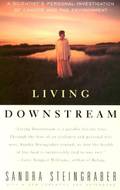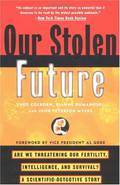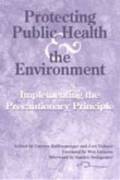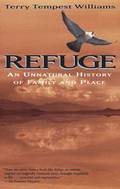Menu

More books on:
• food sovereignty
• ecofeminism
• peace and war
• globalization
• struggling against the odds
• seeking solutions
• others
Selected titles:

- "Living Downstream," by Sandra Steingraber

- "Our Stolen Future," by Colborn, Dumanoski & Peterson Myers

- "Protecting Public Health & the Environment," by C. Raffensperger & J. Tickner

- "Refuge," by T. Tempest Williams
Environmental health
In the spirit of Ellen Swallow Richards and Rachel Carson, women scientists investigate environmental threats.
Living Downstream
A Scientist's Personal Investigation of Cancer and the Environment
Sandra Steingraber
Vintage Books, New York 1997
374p. $14.00 ISBN 0-375-70099-4 Pb
Sandra Steingraber is a biologist and poet who presents and explains scientific data in a way that educates and moves the reader - hopefully to action. A cancer survivor herself, she explains the multiple and inter-related threats to our health coming from a variety of sources: incinerators, agricultural chemicals, production of hundreds - thousands - of chemicals that alone or in combination can cause cancers, birth defects, sterility, permanent genetic change. She argues for the Precautionary Principle: "When an activity raises threats of harm to human health or the environment, precautionary measures should be taken even if some cause and effect relationships are not fully established scientifically. In this context, the proponent of an activity, rather than the public, should bear the burden of proof." Beautifully presented and written, this book should be read by all who inhabit and care about the earth. Find out more about Sandra Steingraber's work at her site:
http://www.steingraber.com/
Our Stolen Future
Are We Threatening Our Fertility, Intelligence, And Survival? - A Scientific Detective Story
Theo Colborn, Dianne Dumanoski and John Peterson Myers
Plume, New York 1997
315p. $13.95 ISBN 0-452-27414-1 Pb
"Over 30 years ago, Rachel Carson's Silent Spring first warned that man-made chemicals were taking a deadly toll on birds and wildlife. Only now ... are we recognizing the full consequences of this insidious threat, which is derailing sexual development and reproduction - not only in a host of animal populations but, it appears, in humans as well." (cover text)
This work by two environmental scientists and environmental journalist Dianne Dumanoski explores the effects of synthetic chemicals on health and reproduction. The "chemical age" that began around World War II has left us with quantities of pollution that is hard to fathom: "Around the world, one hundred thousand synthetic chemicals are now on the market... only a fraction of this number actually do get tested... The world trade in chemicals includes fifteen thousand chlorinated compounds - a category of chemical that has come under attack because of their persistence and a record of causing health and environmental problems." The research on the effects that hormone-disrupting chemicals have on people and (other) animals should be enough to lead to demands for broad international bans on chemical production and use.
Protecting Public Health & the Environment
Implementing the Precautionary Principle
Carolyn Raffensperger and Joel Tickner, editors
Washington, D.C.: Island Press, 1999 $30.00 ISBN 1-55963-688-2
Carolyn Raffensperger, is a "North Dakota dynamo who powers the Science and Environmental Health Network (SEHN), (and) seems to be everywhere at once... SEHN's new book-length anthology will satisfy anyone who wants to know the history of the precautionary principle, where it fits into environmental law, how it has developed in Europe, and how the principle can be applied in many different settings. SEHN's book is deep and rewarding, at once philosophical and factual, a thoroughly satisfying volume. " - Rachel's Environmental Weekly (8 July 1999)
See also: Science and Environmental Health Network's THE PRECAUTIONARY PRINCIPLE IN ACTION: A HANDBOOK (June 1999).
Refuge
An Unnatural History of Family and Place
Terry Tempest Williams
Vintage Books, New York 1991
303p. $12.00 ISBN 0-679-74024-4 Pb
"In the spring of 1983 Terry Tempest Williams learned that her mother was dying of cancer. That same spring, Great Salt Lake began to rise to record heights, threatening the Bear River Migratory Bird Refuge and with it the herons, owls, and snowy egrets that Williams, a poet and naturalist, had come to guage her life by. One event was nature at ist most random, the other a by-product of rogue technology: Terry's mother, and Terry herself, had been exposed to the fallout of atomic bomb tests in the 1950s. As it interweaves these narratives of dying and accommodation, Refuge transforms tragedy into a document of renewal and spiritual grace, resulting in a work that seems certain to become a classic in the literatures of women, nature and grieving." (cover text)

